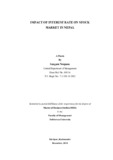Please use this identifier to cite or link to this item:
https://elibrary.tucl.edu.np/handle/123456789/1042| Title: | Impact of Interest Rate on Stock Market in Nepal |
| Authors: | Neupane, Sangam |
| Keywords: | Interest;Stocks;Market |
| Issue Date: | 2018 |
| Publisher: | Central Department of Management |
| Abstract: | The stock market index is taken as a barometer of an economy. Growth in stock index is normally considered as a good sign since it implies the investors are confident about the future prospect of the economy. For this, it is necessary to understand the relationship between the stock market index and the factors that influence it. Bank rate, deposit interest rate, lending interest rate and short term risk free interest ratemay affect stock market. Good investors always look for investing in an efficient market. In an inefficient market few people are able to generate extra ordinary profit causes of confidence losses of general people about the market. In such cases, if the rate of interest paid by banks to depositors increases, people switch their capital from share market to bank. This will lead to decrease the demand of share and to decrease the price of share and vice versa. On the other way, when rate of interest paid by banks to depositors increases, the lending interest rate also increases lead to decrease the investments in the economy which is also another reason of decreasing share price and vice versa. So, theoretically as per the theory of pricing inverse relationship between share price and interest rate. The objective of the study is to find the impact between interest rate and stock market. some specific objectives are to find the impact of bank rate on stock market return, thenature of investors on share investment, the differential between stock market return and risk-free short term interest rate, impact of deposit interest rate on stock market return, impact of lending interest rate of stock market return on share market of Nepal. A majority of earlier studies mostly indicated that there is significant and negative relationship between interest rate and share market. Some of them has used deposit interest rate where as some of them has used T-bill rate to find out the relationship between interest rate and share prices. In this report, which have used four independent variables to define relationship between interest rate and share prices. This study has investigated these implications in the context of our country to see whether the results support the previous studies or not. |
| URI: | http://elibrary.tucl.edu.np/handle/123456789/1042 |
| Appears in Collections: | Finance |
Files in This Item:
| File | Description | Size | Format | |
|---|---|---|---|---|
| Sangam Neupane.pdf | 484.92 kB | Adobe PDF |  View/Open |
Items in DSpace are protected by copyright, with all rights reserved, unless otherwise indicated.
